It's Saturday January 24, 2026

Lots of boats come to Oriental, some tie up at the Town Dock for a night or two, others drop anchor in the harbor for a while. If you've spent any time on the water you know that every boat has a story. The Shipping News on TownDock.net brings you the stories of the boats that have visited recently.
June 20, 2012
Asmall craft advisory was in effect one day in late April. Winds were forming white caps on the Neuse River near Oriental. Fisherman Keith Bruno didn’t venture out that morning because of the conditions. But his guest did.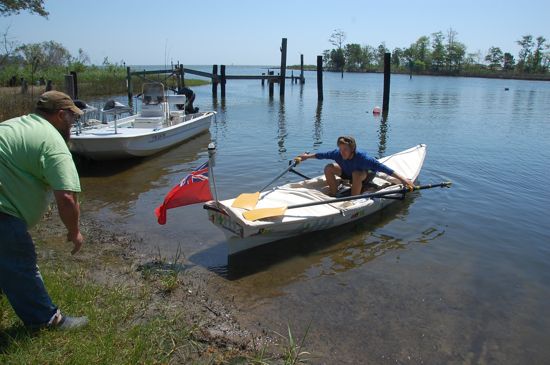 Keith Bruno helps Lewis Colam push off from Endurance Seafood. The creek there was calm as glass, but rougher waters awaited on the Neuse River that morning..
Keith Bruno helps Lewis Colam push off from Endurance Seafood. The creek there was calm as glass, but rougher waters awaited on the Neuse River that morning..Lewis Colam got in to his 15-foot boat at Endurance Seafood, near Pecan Grove Marina, and began rowing. He was a man on a mission — Miami to New York — and anxious to be on his way north. He rowed and rowed, aiming to put in a 10 or 20 mile day.
 Lewis Colam rows north during a small craft advisory on April 26.
Lewis Colam rows north during a small craft advisory on April 26.The conditions didn’t allow that. A mile in to that day’s journey, a wave swamped his heavily-laden light-weight rowing scull near the entrance to Whittaker Creek. It would be another three days before Lewis Colam would leave Oriental.
From There to Here and Here To ThereHow he came to be in Oriental in the first place is a story that began last fall. Lewis says he was working as a management consultant for a retail grocer in London. 24 years old, he says he was looking for an adventure, doing something he hadn’t done before. The Plymouth native also wanted to raise money for a charity, and to to do this without encountering cold weather. It had to be in a place warmer than an English winter.
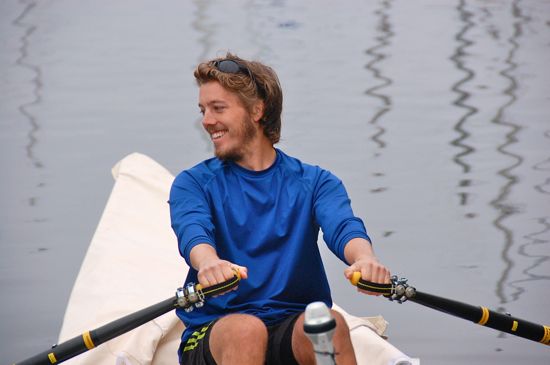 Lewis Colam.
Lewis Colam.He’d seen his girlfriend’s grandmother suffer from Alzheimers, and decided to raise funds for the Fisher Center For Alzheimer’s Research Foundation. His experience on boats was pretty much being on the occasional ferry and despite not liking to swim, he decided to take to water. He’d row a boat, which met his criteria of something he’d not done before. His warm winter route would be the ICW between Miami and New York. (It was that or New Zealand, he says, but he recalled a trip he’d made to the southern US —from Tennessee to Texas — a few years earlier and wanted to return to this part of the world.)
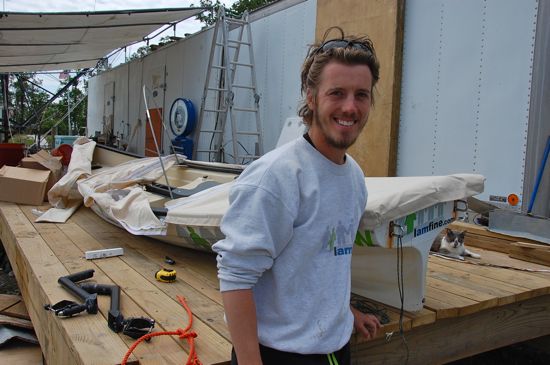 Lewis Colam at Keith Bruno’s Endurance Seafood. He made repairs to the boat there, namely fixing a hole created days earlier when the rowing boat ran in to a metal rod on the ICW near the SC border.
Lewis Colam at Keith Bruno’s Endurance Seafood. He made repairs to the boat there, namely fixing a hole created days earlier when the rowing boat ran in to a metal rod on the ICW near the SC border.Lewis gave notice within a day or two at his job. He packed up his London flat, and two months later, he was in Florida where Little River Boatworks was giving him a boat to row.
He took off on March 3 without a compass or even charts, just pointing the boat in a direction he thought was north. He says he had to ask sometimes. He eventually got a chart book, tearing out a page at a time for his day’s travel and then throwing it away once he completed that length.
He had been at it for almost two months and was more than halfway in to his 1400 mile row when he pulled up to Keith and Marianne Bruno’s yard at Endurance Seafood on April 24. He had some repairs and retrofits to make and was anxious to resume his trip after a day on land.
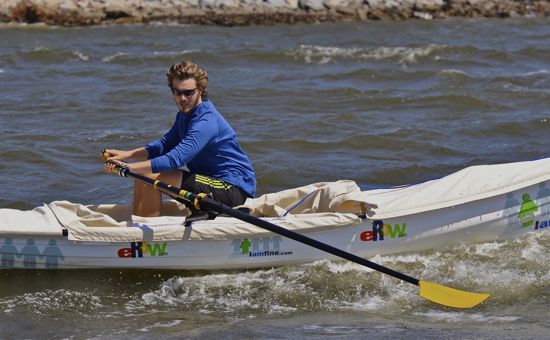 Rowing off of the Oriental waterfront.
Rowing off of the Oriental waterfront.As it would turn out, he spent four days in Oriental and we caught up with him for a few moments to talk about his trip to that point:
“Either Boring or Dramatic”After a month and a half, he said he still has to think about which side of the boat is port and which starboard. But he came to realize one thing of being on a boat:
“It’s either boring or dramatic.” He discovered that as he was trying to capture some of the voyage on video. “If it’s boring, I don’t think to record it and if it’s dramatic I’m trying not to capsize. Seems to go from one to the other very quickly.”
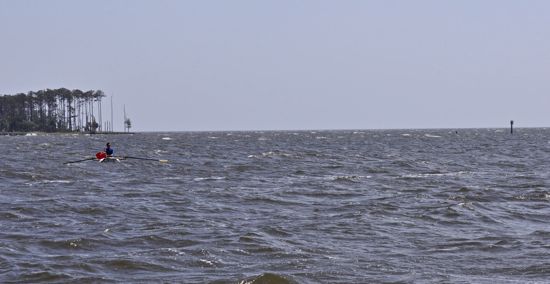 Small boat, wide river. Lewis Colam approaching Whittaker Point. His rowing boat would swamp near there, and another repair became necessary, putting off his departure for three days.
Small boat, wide river. Lewis Colam approaching Whittaker Point. His rowing boat would swamp near there, and another repair became necessary, putting off his departure for three days.“The whole thing is very slow. Sometimes uneventful,’ he says of life at 3 miles an hour. “It’s amazing to see things, just to be living a slower life. I’ve seen lots of wonderful nature.”
That said, it wasn’t a solitary Walden experience he was after.
Encountering – Not Fleeing — Society“The main reason I’m doing this isn’t to get away from society and back in to nature. It’s like the complete opposite. It’s to meet more people, to meet as many people as possible.. really have that human interaction.”
“The best thing about doing these things is getting a chance to meet people you’d never meet. If you went on holiday you’d stay in a hotel, eat in a restaurant. You’re not meeting local people.”
Along the way, strangers have taken him in and given him a comfortable bed in their homes for the night, as was the case at the Brunos’. (It was someone he met in Wilmington who put him in touch with the family in Oriental.)
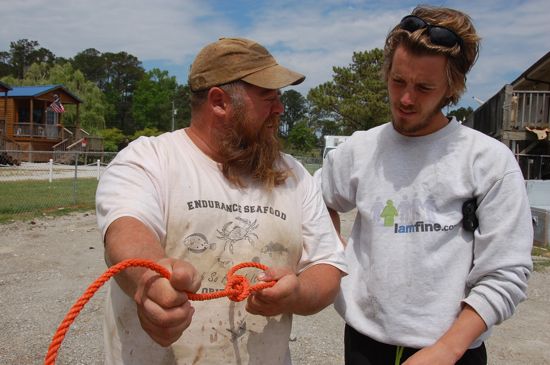 Keith Bruno goes through the basics of the bowline. (Lewis says he didn’t know knots going in to this trip.)
Keith Bruno goes through the basics of the bowline. (Lewis says he didn’t know knots going in to this trip.)“When you see someone’s house.. it’s just interesting to see how people are living on the other side of the world.”
But there have been stretches of the trip where he’s gone 3 to 4 days without seeing anyone at all.
Moby Dick and the ICW“Something I didn’t absorb in England is that 100 miles on the map with no development may not sound a lot but when it comes to it, when you row 3 miles per hour that can be four days.”
The challenge he’s faced is carrying enough food and water. “I carry everything I need on the boat.”
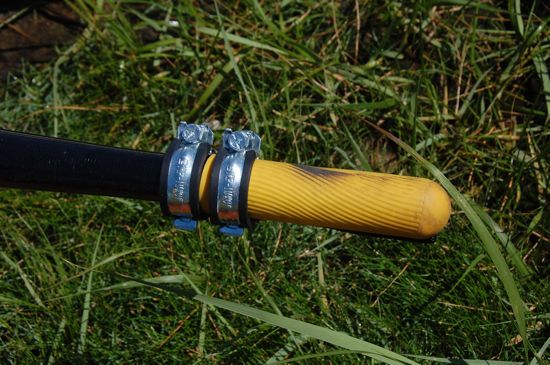 The handle of an oar on the boat, after hundreds of miles up the East Coast.
The handle of an oar on the boat, after hundreds of miles up the East Coast.The boat is a light 100 pounds, but with his stores of food and clothing and gear, the weight doubles. When he has to, he’s used the boat as his bunk for the night, removing the rowing seat and stretching out in the middle of the boat. For protection from the elements he says, he put a “canvas sheet” over the open area.
Another challenge during those long days of rowing, he says, is “to make sure you don’t go insane.” How does he combat that? Lewis says he’s been listening to audio books.
“I finished Moby Dick two days ago and I just started “Nicholas Nickleby” – Charles Dickens – which is nice. It’s good. I mean I would never read a Dickens at home, cos it’s just too long.”
Not so with the audio book version.
“It must be abridged. It takes 3 hours. I start at 6 in the morning, by 9 I’m finished. It zooms by.”
[page]
Changes In Musical TasteOn those 10 and 12 hour days on the water, he’s also been listening to a lot of music. But due to some tough days, his taste in the music has changed. And early on he banned some musicians and songs from his iPod.
When Lewis began his trip, he says, he was listening to music — the Smiths, Morrissey and Radiohead for example, that he says “most people would find depressing,” but which he thought of as “sort of uplifting and spiritual and powerful.”
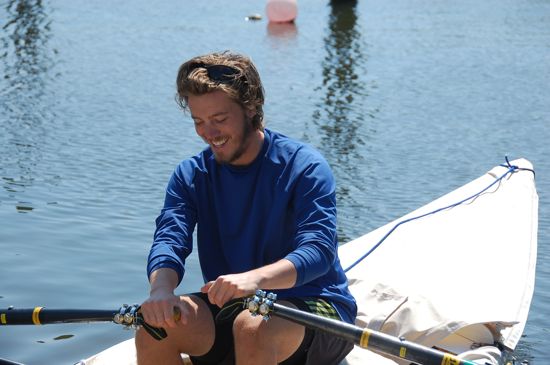 Lewis Colam.
Lewis Colam.But after an eight-day slog at the beginning of his trip, he grew despondent, and he figured a change in listening habits was necessary.” No more Morrissey, no more Leonard Cohen or Jeff Buckley. “Anything too downbeat,” Lewis says, and “you just end up rowing slower and slower and slower til you realize that you stopped. You’ve got your head in your hands.”
HeadwindsThe background music aside, those 8 days of misery at the trip’s start — Day 2 to Day 10 — could be chalked up to the novice rower not knowing when to give himself a break.
“I had 20-25 mph headwinds for pretty much 8 days. Sometimes a side wind, which is just as bad. I’ve never rowed before, I had no experience. I just thought, “I’m going to get this every week” so I just rowed through it.. Looking back you think, ‘What an idiot.‘”
Noting that this was happening alongside the shores of Florida, Lewis says, “I should’ve just stopped and gone to a beach somewhere, spent some money and stayed in a hotel, rather than soldiering on through these awful conditions.”
For all that effort, he says, “I made no distance. Rowing for 10-12 hours a day as hard as I could, finishing exhausted, being 10 miles up the coast is just demoralizing. I could have walked it. I could have dragged the boat thru the water, it was shallow enough.”
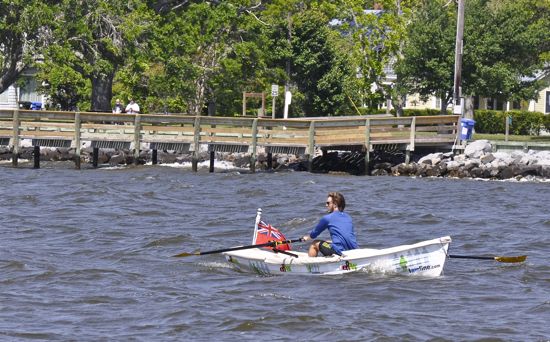 On his first attempt at leaving Oriental, Lewis Colam rowed from Endurance Seafood near Pecan Grove Marina, past the Oriental waterfront and towards Whittaker Creek. (Moments after this photo was taken, his boat got swamped.)
On his first attempt at leaving Oriental, Lewis Colam rowed from Endurance Seafood near Pecan Grove Marina, past the Oriental waterfront and towards Whittaker Creek. (Moments after this photo was taken, his boat got swamped.)Making that little progress at the start of a 1400 mile trek — and to the soundtrack of a lot of minor keys — gave him pause.
“I guess I couldn’t see how I was going to finish. Couldn’t see how I was going to get to the finish line. All I could see was just defeat and humiliation, really. That was a real trial.”
“But I got through that. I broke the back of that and psychologically I feel like I can deal with a lot more. I’ve also done 900 miles so I can look back at the map and be confident with the distance I’ve gone.”
Industrial Strength Bug SprayIf that trial was going on inside, when he got to Georgia, Lewis faced a more external challenge. Mosquitoes and flies descended on him in his open boat both as he rowed and when he stopped. The boat hadn’t come with any screened enclosure, just a canvas sheet he laid over it when he went to sleep at night.
He went shopping for some bug spray off the shelf of at a marina in Georgia. The clerk there told him that he had “‘something stronger behind the counter.’” It turned out to be, Colam says, “industrial strength” bug repellent.
“Lord knows what it was. It should be banned I’m sure, some sort of pesticide or something.”
In telling the story, he does note that the instructions said “‘don’t put it on your skin.’” but as he was applying it around him, he says, “a little bit may’ve sprayed up.”
“You just think, ‘I’ll be fine.’” he says, “But no, it’s not fine.”
His first indication came when his iPod began sounding scratchy and put static in his ears. Then the headphones stopped working entirely. He took them off and realized that the bug repellent had “melted my headphones.”
As for the “industrial strength” bug repellent, “It’s definitely not going on my skin anymore.”
Oriental Bound After Boat HolingBugs were still a presence when he rowed across the SC/NC border, but not his only concern that day. He entered North Carolina on the 100th anniversary of the Titanic sinking. That turned out to be fitting because on the ICW, he rowed into a metal spike which punctured the outer skin of the carbon fiber boat. Water was getting in between the two skins, making the boat heavier to row.
 Lewis Colam with Keith Bruno at the Endurance Seafood compound. They fixed a hole in the boat and installed a screened enclosure for the vessel so that on the second half of the trip, Lewis could have more bug-free sleep.
Lewis Colam with Keith Bruno at the Endurance Seafood compound. They fixed a hole in the boat and installed a screened enclosure for the vessel so that on the second half of the trip, Lewis could have more bug-free sleep.That was one of the things he had to attend to at Endurance Seafood. Another was taking delivery from the boat manufacturer of a cover for the ends of his boat — to keep his gear from getting sprayed by the water — and a zippered screened-in area so that bugs — and snakes — stayed outside while he slept in the boat.
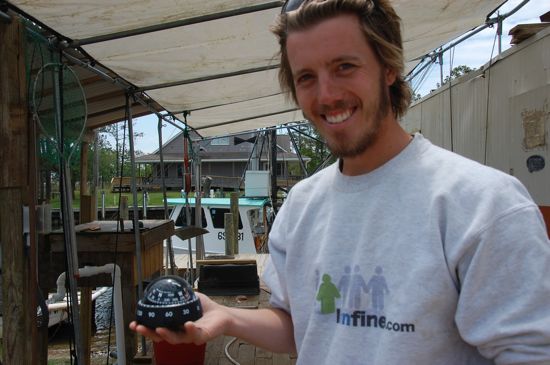 Lewis Colam in Oriental with the special compass given him by a supporter. As has happened on this fundraising trip, someone following Lewis’s travels and travails on line sent him something he thought he could use – in this case a compass designed for aft-facing rowers, making it easier to determine the boat’s course.
Lewis Colam in Oriental with the special compass given him by a supporter. As has happened on this fundraising trip, someone following Lewis’s travels and travails on line sent him something he thought he could use – in this case a compass designed for aft-facing rowers, making it easier to determine the boat’s course.After a day on the ground tending to the boat repair, Lewis was anxious to take off. This was the morning of the small craft advisory — the conditions had kept Keith Bruno from going fishing that morning gone fishing that morning. White caps were visible on the open river. Lewis, though, wanted to head toward New York. (One factor: He was concerned that his visa might not last long enough for the trip.) And so, he rowed out in to the chop of the Neuse, the freeboard of his boat at times barely visible.
 Lewis and boat rowing in the small craft advisory conditions on the Neuse. A few moments later, his boat swamped near the entrance to Whittaker Creek, setting in motion a three day delay on leaving Oriental.
Lewis and boat rowing in the small craft advisory conditions on the Neuse. A few moments later, his boat swamped near the entrance to Whittaker Creek, setting in motion a three day delay on leaving Oriental.Within a half hour, his boat was swamped — it might’ve happened sooner if not for the new covers fore and aft.
Then, while trying to get in to Whittaker Creek to ride out the gusty conditions, he discovered a problem with the oar locks.
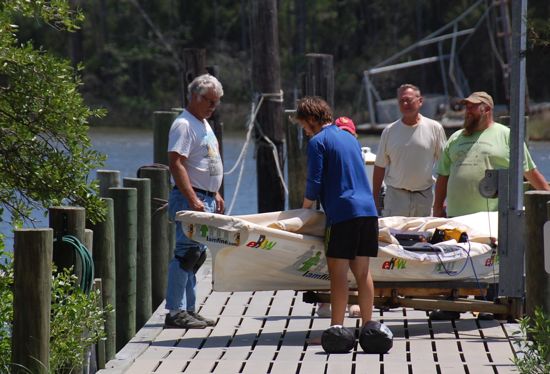 Lewis and boat come to land at Whittaker Creek where more repairs are needed.
Lewis and boat come to land at Whittaker Creek where more repairs are needed.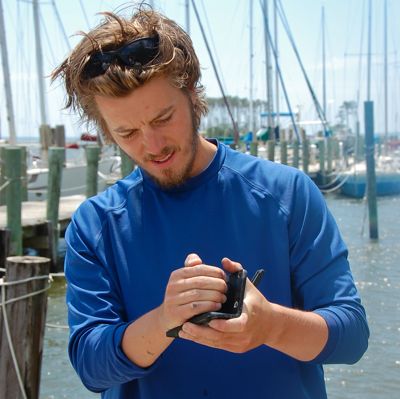 Lewis and boat come to land at Whittaker Creek where more repairs are needed.
Lewis and boat come to land at Whittaker Creek where more repairs are needed.A couple more days of work and the help of some new friends and he took off on a Sunday morning, bound for New York.
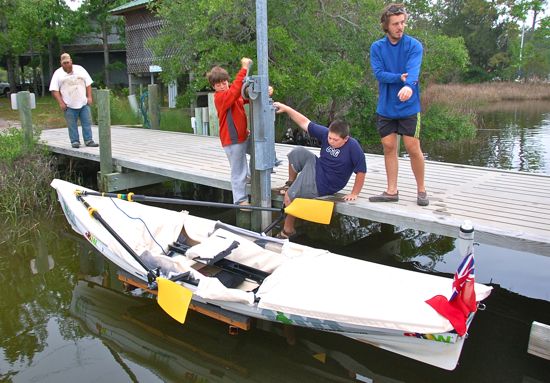 Departure from Oriental, Take Two. After a three day delay, Lewis Colam gets his boat back in the water, here at Whittaker Creek Marina with some help from Zack and Ben Bruno.
Departure from Oriental, Take Two. After a three day delay, Lewis Colam gets his boat back in the water, here at Whittaker Creek Marina with some help from Zack and Ben Bruno. Lewis Colam rows away from Oriental on April 29.
Lewis Colam rows away from Oriental on April 29._____________________
Update: On June 12 Lewis Colam rowed up the Hudson River and ended his trip coming ashore in Manhattan. On his 101 day journey, he raised $28,000 for the Fischer Center for Alzeihmer’s Research Foundation. Contributions are still being accepted.
Lewis has been blogging about his trip with audio reports every few days via Iamfine, a service intended for those living alone to check in with others. To hear Lewis’s accounts of his trip, recorded along the way, click here.
